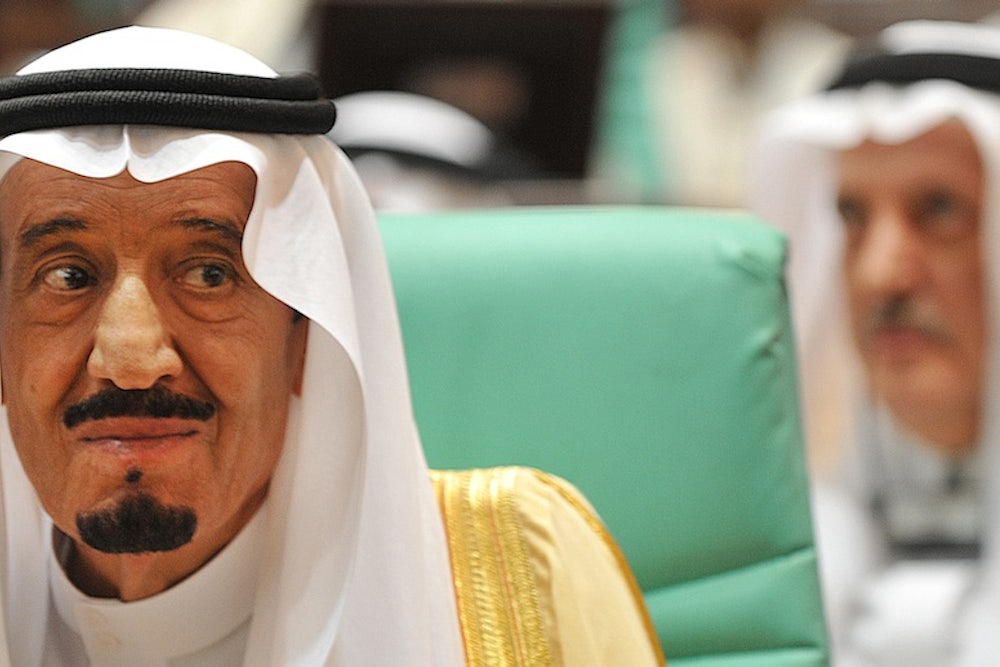There is plenty of blame to go around for the current mess in Iraq, but reprimanding Washington, Iraqi President Nouri Al-Maliki, or the Islamic State of Iraq and the Levant (ISIL) will solve nothing. The real fault should be assigned to those actors who, despite having tremendous influence and real leverage over the majority of the Iraqi antagonists, have so far decided not to intervene politically. That’s Iran and Saudi Arabia.
A dialogue between the Iranians and the Saudis is desperately needed not just to stop Iraq’s bleeding and prevent another full-blown civil war, but to extinguish at least the major Sunni-Shi’ite fires throughout the Middle East that are fueling this violence and chaos.
This is not a naive call for putting an end to an old and fierce rivalry between Saudi Arabia and Iran and to an historic feud between the two biggest branches of Islam. That’s just not going to happen. Instead, this is a realistic invitation for two regional heavyweights who, for better or worse, speak for the majority of Sunnis and Shi’ites in the Middle East, to negotiate a path out of this catastrophic situation. Call it arms control, dialogue, or cooperation. The bottom line is that they need to sit down and talk about ways to manage or stabilize their regional competition by agreeing to hard rules that would benefit both, otherwise Arab League chief Amr Moussa’s nightmare scenario of the gates of hell opening in the Middle East will turn into a reality.
In Iraq, Al-Maliki is a big part of the problem, but he is a problem that the Iranians (along with the Americans) created and can easily solve. Saudi Arabia knows that Al-Maliki is Iran’s man in Baghdad, so the first item on the hypothetical Saudi-Iranian negotiating agenda is a new power-sharing arrangement in Iraq that removes Al-Maliki and reintegrates the Sunnis into political life. Because the Shi’ites are the majority in Iraq, the balance of power will always tilt in their favor, but this doesn’t have to translate into Sunni exclusion and Shi’ite domination (as it has been the case under Al-Maliki), and the Iranians and the Saudis can negotiate that.
In Bahrain, Yemen, and Lebanon, similar realistic bargains can take place. Iran should have no business fomenting unrest in Saudi Arabia’s backyard: in Bahrain by supporting radical segments of the opposition there, and in Yemen, where Iran is suspected of sending arms to the Houthi rebels. In Lebanon, while Iran will not instruct Hezbollah to relinquish its weapons (it’s much more complicated than that), it certainly can influence the powerful Shi’ite group’s future in ways that can help it address the concerns of Lebanon’s Sunni players (and Christians and Druze), the most relevant of whom are allied with Riyadh. And even inside the Saudi Kingdom, Iran should reassure Saudi Arabia that it has no intentions of stirring trouble in the Eastern Province, which is predominantly Shi’ite.
Syria will be the toughest nut to crack. The Saudi-Iranian differences there are most acute. Saudi Arabia has spent a vast amount of material resources to topple Syrian President Bashar al-Assad while Iran has had to incur even heavier costs to do the exact opposite. At present, Iran seems to have the upper hand in Syria, but the conflict is anything but stable and Saudi Arabia has not said its final word yet. Progress on the other regional issues could help pave the way for some sort of deal that cuts Saudi losses, caps Iranian gains, and preserves major Saudi and Iranian security interests in the country, including the defeat of extremist elements that are associated with ISIL and Al Qaeda.
As the United States mulls its options in Iraq, the smartest thing it can do is encourage, with the help of Britain, France, and Russia, the Iranians and the Saudis to announce a summit for high-level, comprehensive political talks between their leaders.
This is the most important conversation that should be happening today in the Middle East, and we are not too far from it. Today, there is an open invitation from Saudi Arabia to a dialogue with Iran, but Iran has yet to respond. Instead, it seems to be more interested in brokering deals with Washington in Vienna by offering security cooperation in Iraq. A potential U.S.-Iran meeting in Vienna could produce tactical gains but it is absolutely no substitute for a Saudi-Iranian strategic dialogue.
